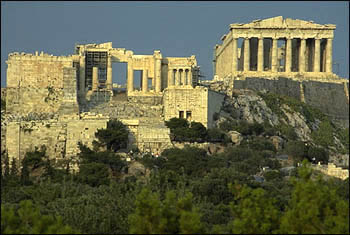
The Concorde, 1982. Photo Y. K. Cummins
Desires
I
She said on a number of occasions that if we had a lot of money she would love to cross the Atlantic on the Concorde. I pointed out, in my rationalistic way, that if one were going to cross the Atlantic first-class, one would do better to take a slower plane and have more time to savour the luxuries. But that was beside the point for her. I think there was something about the whole idea and look of the Concorde that fascinated her.
She would have liked to be able to go to Australia and visit the sites that Arthur Upfield talks about in the Bony books. I suspect that the Australia of those books was vivid and three-dimensional for her. She put a large map of Australia on the wall of our small second bedroom. I wish that she had marked the numerous Upfield sites on it, but presumably she didn’t need to, she knew them already. She liked maps, especially our various maps of Mexico.
She would have liked to go on a nature safari in Africa.
II
She would have liked to have a dining-room large enough for a table, preferably a round one, that would comfortably seat eight or ten people. She felt embarrassed on the rare occasions on which we sat eight people at our table that was only meant for six. Personally I thought that those occasions went well, with plenty of good talk, but obviously it just didn’t seem right to her.
She also from time to time spoke about how nice it would be to have a set of nice-looking matching dishes for dinners. I suspect she was too modest to recognize that people enjoyed being there because of her, and her superb cooking, and the kind of talk that went on.
In his account of his Scottish tour with Samuel Johnson, Boswell tells of how on one occasion they were visiting with the head of the clan MacGregor, and some Englishman or Lowlander asked the head if he wouldn’t prefer to sit at the head of the table. To which came the reply, “Where MacGregor sits is the head of the table.” I doubt very much that anyone went home after one of Carol Fraser’s dinners being catty about the tableware.
She would also, I am sure, have been happy to have a decent-sized kitchen, instead of the relatively cramped and inconvenient one in which she had to work.
She would have loved to have a dressing-room of her own, with a full-length mirror (at least until she started putting on weight in the Eighties). As it was, she had a tiny closet in our bedroom for her dresses, skirts, pants, and blouses, and had to do her morning dressing in semi-darkness because she got up some time before me and didn’t want to wake me.
III
She very much wanted to visit the Acropolis, but we never went to Greece. I wasn’t interested in the Acropolis myself, and Athens sounded as if it would be hot, dry, dusty, noisy, and alien.
When we played from time to time the suppertime game of speculating about what we would do if we were to come into a lot of money, she reiterated how nice it would be to have pied-à-terres in three or four places, such as Halifax, London, Mexico, and Paris/Provence. I myself was a bit churlish about What If games, but she very much liked the idea of having a home base—Halifax—from which one could move away easily whenever one wanted to.
She virtually never expressed any desire to meet celebrities. She would have been glad, I imagine, to have ideal visits with Chagall and Kokoshka, and probably also with Yves Montand and Simone Signoret. But after that?
Nor did she express any interest in staying in fancy hotels or eating in fancy restaurants, or buying fancy clothes. After awhile she got fed up with the kind of cheap hotel that set her allergies flaring or twisted her back with a sagging mattress. And she enjoyed it when the Cambridge University Press, during the brief promotional tour they organized for my 1974 book Violence in the Arts, put us up for a couple of nights at the Hay-Adams hotel in Washington D.C. in a really elegant room that felt to us about the size of a ballroom.
But that was a gift of the gods. When we were in New Orleans a year ago on our way back from Ajijic, and she wanted to take me somewhere for my birthday, I tentatively mentioned a restaurant that was highly praised in a food guide that I had with us. After taking one look into it from the doorway, she turned the idea down flat. She simply, she said, didn’t have the proper clothes for such a place, and would feel humiliated in it.
IV
Did she regret not having had children? Friends of hers like Dorothy Anderson, Mimi Cazort, and Barbara Clarke probably know more about that than I do, but I am inclined to say not. Not deeply, anyway. Certainly I myself don’t.
During our time at Minnesota and for our first four years in Halifax we were scrupulously careful. I don’t recall our ever talking about the undesirability of babies, or speculating about when we might have one. We simply both knew that the kind of work that we were doing then was incompatible with parenthood. In 1965, without making a big thing of it, we decided, I’m sure on her initiation, to accept a child if one came along. But when I had my sperm count checked after a few months, it emerged that I was virtually sterile, probably because of a fierce bout of chicken-pox that I had had when I was fourteen or so. It also accelerated my ridiculous growth.
We never considered adoption, so I would guess that we weren’t interested in simply having a child. I’m pretty sure she knew I would be a difficult father. On one occasion, when I had exasperated her unendurably, she yelled at me that she was thankful that we didn’t have children. But she may also have had doubts about herself, and about the price that she would have to pay as an artist.
We both voiced mild anxieties about what would result from the mixing of our gene pools. I suspect that if we had had a child it would have been a boy and very tall. It would also almost certainly have been our only one.
During our last few years together, it crossed my mind from time to time that one of the advantages of children is that they keep one in touch with the changing world, go on introducing variations into one’s life, and give one something fresh to talk about. But I don’t regret not having had one. I don’t imagine that things would have gone well for it, and I know that neither C., nor I could have accomplished what in fact we accomplished in our separate but linked careers.
I would guess that she felt that children were in a manner of speaking God’s gifts, and that if one came—at least once we were established in Halifax—it would be improper to refuse it, but that there was no need for us to struggle to have one. She was irritated by the kinds of faculty wives and mothers who talked endlessly about their own children and acted as if the first duty of a woman was to have babies. One of the pleasures of our friendships with Bruce Greenfield and Anne Higgins and with Joyce and Rob Stevenson was that, like our older friends the Donagans, they too didn’t have kids.

The Acropolis

